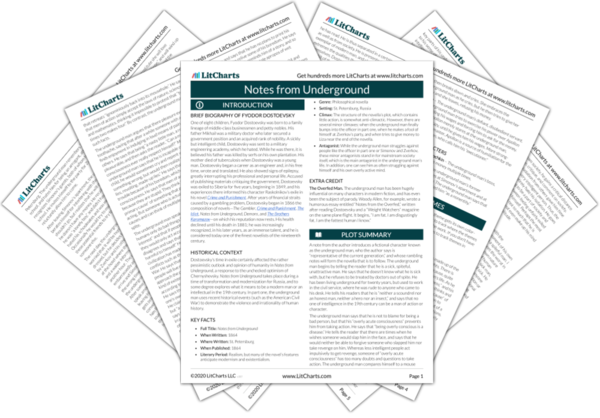Thought vs. Action
Most of Notes from Underground is made up of the underground man’s rambling thoughts. There is little real action in the plot. This is because, quite simply, there is little action in the underground man’s life. As he himself says, he is a man of “overly acute consciousness,” and his excessive intelligence basically cripples him. He over-thinks and questions everything, and cannot settle on a “primary cause” of anything that would then allow him to…
read analysis of Thought vs. ActionLoneliness, Isolation, and Society
The underground man is a lonely, isolated character. He speaks and writes from a mysterious place underground, separated from society. But even before retreating underground, he feels isolated even within society, whether at school (where he had no friends) or at work (where he hates all his coworkers). The underground man lives a life effectively in isolation from mainstream society, but it is not clear whether he does this out of choice—does he reject society…
read analysis of Loneliness, Isolation, and SocietyHuman Nature
Notes from Underground opens with the underground man’s famous assessment of his own character: “I am a sick man. . . . I am a spiteful man. I am an unattractive man.” He is pessimistic and sees the worst in himself. Moreover, he often generalizes from his own nature and his own ideas about people to speak broadly of human nature. He presents himself not only as one spiteful, sick man, but as an example…
read analysis of Human Nature
Reason and Rationality
The Russian writer Nikolay Chernyshevsky and his followers believed that man only desired what was in is best interest, and that mankind could be improved and taught to listen to reason so that society would progress to a kind of utopian existence, symbolized by the image of a perfect crystal palace (which the underground man derogatively refers to). The underground man can be seen as Dostoevsky’s answer to Chernyshevsky.
In part one, he rambles and…
read analysis of Reason and RationalitySpite, Pain, and Suffering
The underground man is a spiteful man (he himself says so), who takes pleasure in annoying and harming others. He irritates his former schoolmates, fantasizes about slapping Zverkov in the face, and drives Liza to tears by describing her horrible situation as a prostitute. This malice toward others is one way in which the underground man separates himself from others and shows that he wants no part in mainstream society.
But if the underground man…
read analysis of Spite, Pain, and SufferingLiterature and Writing
One of the ways in which the underground man differs from others and isolates himself is through his obsession with literature. As he recalls in part two, he grew up without many friends and spent much time reading. Similarly, he says that much of his time underground is spent reading. As a solitary activity, reading isolates the underground man from others. Moreover, his excessively literary sensibility prevents him from functioning normally in society. He is…
read analysis of Literature and Writing






